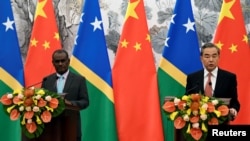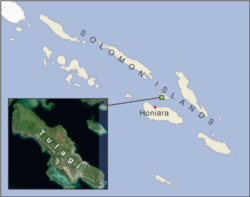The Solomon Islands government said a deal signed by one of its provinces to lease the entire island of Tulagi to a Chinese company is unlawful and should be terminated, a move applauded by United States Friday.
Details of the long-term lease between Solomons’ Central Province and China Sam Enterprise Group were made public shortly after the Pacific nation switched diplomatic ties to Beijing from Taiwan in September. The shift was strongly criticized by the United States.
Solomons Attorney General John Muria said the province and the Chinese company were not legally able to strike such an agreement without government involvement.
“The agreement was not vetted by the Attorney General’s chambers before signing,” Muria said in a statement.
The agreement was “unlawful, unenforceable and must be terminated with immediate effect,” Muria added.
Esper applauds decision
Though tiny in land mass, Pacific islands such as Tulagi have re-emerged as a strategic priority for the world’s biggest nations, who are keen to lock-in alliances with countries that control vast swaths of resource-rich ocean between the Americas and Asia.
China, in particular, has in recent years expanded its financial and political influence in the Pacific, which had long been a diplomatic stronghold for the United States and its regional allies since World War II.
U.S. Defense Secretary Mark Esper applauded the Solomons’ decision to invalidate the agreement, which he described as a “Chinese effort to lease the island of Tulagi for 75 years.”
“This is an important decision to reinforce sovereignty, transparency, and the rule of law,” Esper said in a statement.
“Many nations in the Pacific have discovered far too late that Chinese use of economic and military levers to expand their influence often is detrimental to them and their people.”
Chinese conglomerate
The Sam Group agreement, dated Sept. 22, purportedly offers wide-ranging powers to the Chinese conglomerate to develop infrastructure on Tulagi and surrounding islands.
Headquartered in Beijing, Sam Group is a technology, investment and energy conglomerate founded in 1985 as a state-owned enterprise. It declined to make available executives who could speak to Reuters Friday.
In a statement on its website, Sam Group said its representatives had met Solomons Prime Minister Manasseh Sogavare in early October during a state visit to China by a delegation from the Pacific island nation.
Tulagi hosted American bases in World War II and was the site of the Solomons’ capital before it was moved to the island of Guadalcanal.
A signatory to the agreement, Central Province Premier Stanley Manetiva, told Reuters that he would abide by the government’s advice.
“We have to comply to follow the right procedures,” Manetiva said.
Chinese Foreign Ministry spokeswoman Hua Chunying said she had “no understanding” of the issue. But China has consistently called on Chinese companies operating abroad to follow local laws, she added.
Debt traps
Taiwan and the United States criticize China’s interests in the Solomons, saying Beijing will saddle it with unsustainable debt.
Yao Ming, deputy chief of mission at China’s embassy in Papua New Guinea, said at a briefing in the Solomons capital of Honiara on Wednesday that it will build some infrastructure, including a sports stadium, as a “state gift.”
Yao said the United States and Britain were historically responsible for putting countries into financial distress.
“China is not a country to make so-called debt traps,” Yao told local journalists, according to a recording of the briefing obtained by Reuters.
“You can see which country has been embroiled in debt traps ... not China but United States and Britain.”
China's growing influence
China has expanded its influence in the Solomons.
In a setback for self-ruled and democratic Taiwan, which China claims as a province with no right to state-to-state ties, Beijing won over two previous Taiwanese allies in the Pacific, the Solomon Islands and Kiribati, in September.
China will also support Huawei Technologies to build more infrastructure in the Solomons, Yao said.
Australia, a strong regional ally to the United States, has previously limited Huawei’s expansion in the archipelago.
U.S. President Donald Trump has also repeatedly criticized the Chinese telecoms company over national security concerns.
In 2018, Australia agreed to fund the construction of an undersea cable to bring high-speed internet access to the island nation, undercutting a commercial deal between the Solomons and Huawei, over fears the Chinese-laid cables would jeopardize Australia’s own networks.
Huawei has repeatedly denied its equipment provides an opportunity for espionage.






